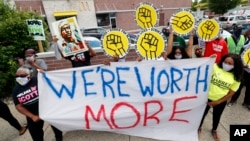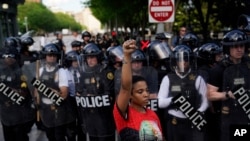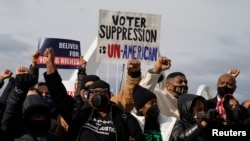African Americans in the United States face an array of challenges, including barriers to building economic wealth, an erosion of voting rights, persistent inequalities along racial lines and disproportionate impacts from the COVID-19 pandemic, a new study issued this week reveals.
In its annual "State of Black America" report, the National Urban League, one of the nation's leading civil rights organizations, found that while African Americans have experienced economic and health gains since 2005, they have fallen further behind white people in education, social justice and civil engagement.
"'The State of Black America' is a commentary on the state of the nation at large," National Urban League President Marc Morial said.
The report's 2022 Black-White Equality Index put Black Americans at 73.9% attainment relative to white Americans across five categories: economic status, health, education, social justice and civic engagement. The score showed a .2% improvement from the 2020 index, but nevertheless indicated that Black people lag significantly behind white people in key areas
For instance, the equality index noted a median household income for Black people at nearly $44,000, which was 37% less than that of white people, at nearly $70,000. The data indicate that Black people are also less likely to benefit from home ownership, which has fueled generational wealth among Americans.
"In that area of wealth, we've seen almost no change — none — since the civil rights days," Morial said in an interview with The Associated Press. "The wealth disparity has gotten wider."
The report also provided a snapshot of health care disparities. It showed life expectancy declined slightly for African Americans to 74.7, four fewer years than a white person. Researchers released other grim statistics indicating that Black women are 59% more likely to die as a result of bearing a child, and 31% more likely to die of breast cancer. And Black men were 52% more likely to die of prostate cancer than white men.
At the same time, the report noted some changing trends between 2020 and 2022. Black students are less likely to consider suicide relative to their white peers; the disparity in breastfeeding rates between Black women and white women declined; and more Black children had a regular place to receive health care.
Overall, however, African Americans have long tended to suffer worse health outcomes than white Americans, a disparity widely believed to have been exacerbated by the COVID-19 pandemic. Researchers say it could take years to fully document the pandemic's impact on Black America.
Criminal justice
The "State of Black America" study also highlighted racial inequalities in the U.S. justice system, finding that Black people were more than twice as likely as white people to experience use of force during police encounters. African Americans are three times more likely to be jailed if arrested, according to statistics from the U.S. Department of Justice.
"The murder of George Floyd and the deaths of so many at the hands of police officials over the last several years has motivated a strong response to systemic racism within the criminal justice system, and that's a good thing," said Wade Henderson, interim president of The Leadership Conference on Civil and Human Rights. "The loss of the George Floyd Policing Act and the failure to get traction in Congress on that (police reform) issue was a profound disappointment."
Voting rights
The report highlighted what it calls "The Plot to Destroy Democracy," outlining voter suppression efforts and urging a national mobilization to protect and defend the constitutional right to vote.
A public opinion poll contained in the study found an overwhelming majority of Black Americans continue to believe strongly in the power of their vote concerning issues of social and racial justice.
Last year, 19 Republican-led state legislatures approved laws that imposed new voting requirements and/or limited the avenues and time frames for people to cast a ballot.
Republicans insist they seek only to prevent voter fraud and to ensure the integrity of elections. Democrats and voting rights groups counter that many of the measures contained in the new laws will disproportionately impact the ability of African Americans and other minority groups, as well as the poor, to vote.
"The burden of these laws with strict photo ID requirements, the elimination or restriction of Sunday voting, voting by mail, early voting, and the closing of polling locations overwhelmingly falls on Black voters," said Morial.
Voting rights advocates have called on the Justice Department to ensure free and fair elections nationwide. However, the department has limited powers following a U.S. Supreme Court decision in 2013 which dismantled part of the 1965 Voting Rights Act that required states with a history of voting discrimination to get pre-approval from the Justice Department before changes are made to state election laws.
Historically, it has been left up to individual states to determine how to conduct elections. Republican lawmakers bristle at any suggestion of federalizing voting in America with uniform rules set in Washington.
"We are seeing more voter suppression efforts in our states," said Melanie Campbell, president and CEO of the National Coalition on Black Civic Participation. "We will find ways to organize as best we can for the upcoming elections while we still fight for voting rights reforms."







